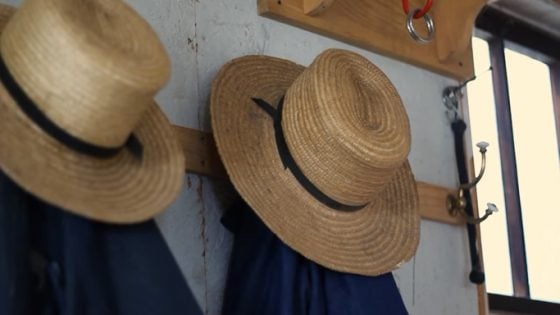Jim Cates: Fighting Off The TV–3 Sons, 3 Approaches
Rumspringa is often exaggerated in the media, to be a wilder time than it is in reality for most Amish youth.
But the fact is, some adolescents test limits during this transitional period, in ways others do not.
 Acquiring and illicitly owning a television set may seem like a light offense from an English perspective, but for Amish families, this can be a great concern.
Acquiring and illicitly owning a television set may seem like a light offense from an English perspective, but for Amish families, this can be a great concern.
Jim Cates today describes how one Amish family dealt with three sons’ attempts to own a TV set–and how their approach changed over from son to son over the years.
Philo Farnsworth, It’s All Your Fault!
For those unfamiliar with the name, Philo is one of the engineering pioneers in the world of television. And for that reason, he is also one of the demons in the story I am about to tell. How unwitting a participant he may have been is open to interpretation, since he lived the latter part of his life in Fort Wayne, near the Grabill Amish.
Rumspringa, while a fascinating developmental phase in its own right, is made even more intriguing by large Amish families. It is not necessarily the eldest child who realizes that this is an opportunity to see just how far the limits can be pushed. However, somewhere down the birth order, as the magic age of 16 is breached, it seems inevitable that someone realizes this potential. Following that fateful recognition and the subsequent attempts to test the limits, the experience of freedom for the remaining siblings is never quite the same.
I am thinking here of the experience of one family and their ongoing fight(s) with that worldly appliance, the television. One of their older sons was a confident, charismatic, and delightful young man who, even while in an Amish school, had difficulty with the concept that rules applied to him. He was exasperating in the extreme, but so charming in his responses that it was difficult to stay angry for any period of time.
And so he reached the age of 16, and all the perks that come with that period of life. And without consultation (for after all, at this age consultation was now unnecessary) he hired someone to serve as a taxi, visited a local department store, made his purchase, and returned to his home with a brand new television set. Not huge. A mere 19-inch model. Something that could be viewed discretely once plugged into a battery. Satisfied, he left it sitting in the bedroom he shared with his brothers, and went to take a shower.
Unbeknownst to him, he had pushed past the edge of a limit. On returning to his room, something seemed amiss. He quickly recognized what it was. The television was gone! But where could it be? A quick circuit of the house convinced him it was not there. Who could have abducted it in that short a time, and where could they have taken it? His siblings were strangely mute. And then he happened to glance out the back window. There stood his father by the burn barrel, can of kerosene in hand. And there as well, crackling and melting more than actually burning, was his newly purchased 19-inch television set.
Fast forward about three years, and his next oldest brother has acceded to the age of 16. However, this sly lad, having learned from his elder siblings’ mistakes, knows better than to boldly bring a television onto the property. No, his ploy was a cat-and-mouse game in which his 19-inch television literally made the rounds of the farm. Attic, basement, barn, woods, outbuildings. There was virtually no place in which this instrument of the world did not reside in the desperate attempt to keep it hidden. I vividly recall pulling in one stormy afternoon to see him running from the back field, television sliding back and forth in his hands. He managed a nod of his chin as he continued his journey, TV precipitously lurching along toward its next intended resting place.
And in the way of wise parents, his mother knew full well that there was a TV on the premises. However, she also appreciated her son’s respect in hiding it from their prying eyes. Accordingly, her unspoken rules of the game were as follows: If you keep the TV hidden well enough, it is yours to use. If I find it, it is mine, and I will show no mercy.
The instrument’s life was foreshortened considerably by rough handling not intended for an item meant to be perched on a stand and left, rather than moved continuously in fear for its existence. And yet (in a tribute to Zenith) it almost survived the lad’s Rumspringa years.
Which brings us to brother #3, about four years later. He had two advantages. First, he had the examples of two older siblings on which to model his own behavior. Perhaps more important though, he had two parents who were rapidly tiring of fighting with adolescents. And so it came to be that he made a tactical decision that turned to his advantage, proving once again that we learn as we go with our children.
And so, first, he purchased a smaller set than either of his brothers. And for the duration of his Rumspringa, his television remained intact. It was not burned, and it did not suffer the indignity of being hauled from pillar to post lest it be confiscated and sledgehammered into plastic and glass shards. No, it sat quietly under a blanket in his closet. A furnishing that neither child nor parents ever addressed, it became the proverbial “elephant in the room,” and proof that not all such elephants need to be directly confronted.
Although once in a great, great while his father would tell me a joke that I recognized. It was stolen from Jay Leno’s monologue the night before on “The Tonight Show.”
I never asked.
Jim Cates is the author of Serving the Amish: A Cultural Guide for Professionals. He can be contacted through this blog or his website at servingtheamish.net.
Image credit: television set– susanad813/flickr









Cute
I read with rapt attention to his story and had to read the surprise ending a couple of times before I caught on. I hope this story gets told more than once!
Oh, the shenanigans!
I am amused by this story. Teenagers will test boundaries no matter what culture they live in. A friend who was raised Amish told about her brothers getting in trouble for hiding radios. They later discovered their dad hid a small one so he could listen to ball games! Maybe dad got the idea from his boys…
Not the children's fault
This is obviously a case where the parents really did not have the values of the brotherhood in their heart. The radio thing shows the same thing. That is why so many of the Amish youth do stupid things in their teenage years. They are just imitating the values that their parents secretly have.
I just hauled four Amish girls the other day. They attended a benefit auction. They had a prayer meeting while there with another man and his wife. They spend their days teaching school, all four of them, probably making peanuts in wages but happy to serve the community. They shook their heads in sadness and disgust at the boys “hanging out” at the feed mill when we drove past, and one said, “I wonder how fulfilling their evening was?”
It’s too bad that people only see the tire-peeling boys, but not the praying girls (and boys).
But it all goes back to the parents who have a form of religion, but do not have their heart in it. The children catch on and reflect the values the parents taught them.
Sometimes knowing your parents have good values is to try other ways.
Not the Children's Fault
There may be some truth in what you say, but I can speak to my own example. My dad is a Baptist minister, and he and my mother raised me with strong Christian beliefs that are important to me to this day. And when I was a teen? Well – suffice to say, I didn’t learn most of the negative behaviors I pulled from my parents. What I did learn from them was that ultimately I am responsible for my own behavior, and that was the lesson that brought me around to a (more) mature way of living. It seems in so many families, there are one or two kids who have to “prove” their independence by rebelling against the family values. And at some point, when they are older, those better values that they were taught and they can’t quite run away from, no matter how hard they try, make them prodigal sons who return and settle down to live quieter lives than they were living. At least, I know I did. That said, sadly I do have to agree that kids are much more perceptive about our real values as parents than we ever give them credit for being. I agree with you 100% there!